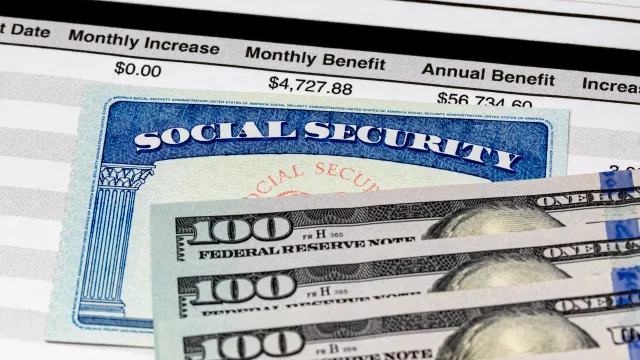5 Benefits of Delaying Social Security, Finance Experts Say
Here's how biding your time could pay off in the long run.

Social Security was created in 1935 to provide a financial safety net to the nation's elderly and later expanded to include benefits for individuals with disabilities. Today, the program supports roughly 66 million beneficiaries, or 20 percent of the American population, according to the Peter G. Peterson Foundation. About 90 percent of people over the age of 65 receive their Social Security benefits, and that income represents roughly 30 percent of older Americans' total income, the organization reports.
For many people entering retirement, Social Security can serve as a financial lifeline—and those benefits can't come in soon enough. However, experts say that you should carefully consider your options before you decide to file a claim. More often than not, they say, delaying Social Security can come with big financial benefits.
Joel A. Larsen, CFP, AIF, principal at Navion Financial Advisors, says that the first step is to calculate your "break even"—the point at which you would expect to get more from social security by waiting versus claiming at full retirement age (FRA). Though none of us can predict the future, he recommends asking yourself: "Are there any factors that might cause you to have a shortened life span? Be sure to include these in your 'break even' scenarios.'"
He adds that it's not always beneficial to delay claiming Social Security. "It's a lot more complicated than just calculating 'break even' using life expectancy," he tells Best Life. "Where will the cash come from to pay your expenses if you delay claiming? For example, does the benefit of delayed claiming outweigh the burden of the additional income taxes if you are taking the money from a qualified retirement account? This requires not only calculating the tax burden but the opportunity cost of taking those funds 'out of production.'"
However, many Americans will find that delaying Social Security is the best financial move. Read on to learn the biggest benefits of putting off payments, according to finance experts.
RELATED: 7 Budget Hacks For Retirement, According to Financial Experts.
1
Taking Social Security early will permanently slash your payments.

Many people are entitled to start taking their Social Security payments once they reach the age of 62. However, the experts say that unless you have good reason to believe your lifespan will be significantly shortened, this is usually a major financial mistake.
"Initiating Social Security at age 62 has an immediate negative impact on your retirement income," explains Regina McCann Hess, CFP, CDFA, a certified financial planner and author of Super Woman Wealth. "Assuming your full retirement age (FRA) is 67, and you wait until then to turn on your benefit, you will receive your full amount. However, if you turn it on early at age 62, you will receive about 30 percent less. This is a permanent decrease and will remain in effect for the rest of your life."
To illustrate just how big the difference can be, Hess says that someone who is entitled to $1,750 per month at age 62 ($21,000 per year) would be entitled to $2,500 per month ($30,000 per year) at age 67. This difference lasts for the rest of that person's life, drastically altering their finances.
2
You'll probably need more money than you think.

In planning for retirement, many people underestimate just how much money they'll need to meet their expenses. If you calculate the benefits of taking Social Security early based on your current spending, you may be sorely disappointed as inflation drives up the cost of your everyday necessities.
"Every dollar counts in retirement," says Hess. "Inflation can have a huge impact on your retirement lifestyle. Strategizing your retirement income is a necessity to decrease the impact of inflation on your lifestyle. Turning your Social Security benefit on at 62 could have long-lasting repercussions."
Melissa Murphy Pavone, CFP, CDFA, director of investments for Oppenheimer & Co. Inc., adds that many people overlook the impact of healthcare costs in retirement. "This added expense, if not accounted for, can quickly deplete retirement savings," she says.
RELATED: 10 Things You Should Stop Buying When You Retire, Finance Experts Say.
3
If you take Social Security early, it affects your earnings limit.

Taking Social Security early can also impact your earnings limit if you're still working. In fact, Kendall Meade, a financial planner for SoFi, says this is one of the biggest mistakes she sees people making in their retirement planning.
"If you are under full retirement age, $1 from your benefit payments gets deducted for every $2 you earn above the annual limit ($22,320 for 2024). This is in addition to you already getting a reduced amount for filing early," she tells Best Life. "If you are still working, it may be worth delaying as long as possible (age 70)."
"It is important to note that once you do reach full retirement age, you can work and receive 100 percent of your benefit," Hess says. However, Meade notes that your benefits may be taxed at a higher rate if you continue to work, even if you've reached this milestone.
RELATED: Never Use Your Credit Card for These 6 Purchases, According to Financial Experts.
4
Delaying even further means more money.

Delaying Social Security even further beyond your FRA results in an even larger monthly payout, which lasts for the rest of your life.
"Waiting until age 70 to turn on your Social Security benefits can add an additional 24 percent to your benefit. Talk about strategizing your retirement income! This can add thousands of dollars to your pocket annually," says Hess.
Returning to her previous example of someone who takes in $1,750 per month at 62 and $2,500 per month at 67, Hess says that same person can expect to receive $3,100 per month ($37,200 per year) at the age of 70. This represents a $16,000 difference annually between the highest and lowest possible payouts.
5
You can spend down your required minimum distributions (RMDs).

Scott Lieberman, founder of Touchdown Money, says that delaying Social Security will also give you the opportunity to spend down the required minimum distributions (RMDs) on your retirement accounts. This is the money from your retirement savings that you must legally withdraw every year.
"You should always spend RMDs before Social Security," Lieberman tells Best Life. "That's because Social Security is at most 85 percent taxable, while RMDs are 100 percent taxable. That can help you save even more at tax time."
RELATED: Retiring on a Middle-Class Income? Don't Make These 9 Mistakes, Experts Say.
It's always wise to consult a financial planner.

Pavone says there's no "one size fits all" answer for how or when to turn on Social Security benefits: "There are many factors to consider; desired retirement age, expected lifespan, lifestyle goals, and anticipated expenses, just to name a few."
She recommends hiring a certified financial planner who can help you navigate your particular circumstances, maximizing your payouts while minimizing your tax burden.
"A CFP can provide personalized guidance tailored to your financial goals and risk tolerance, helping you navigate the complexities of the market and help answer the million dollar questions," she shares. "How much do I need to save for retirement? Do I need to go back to work? Will I be able to retire comfortably? Should I turn on Social Security? How am I going to pay for health care?"
She adds that meeting with a CFP in the years leading up to retirement can help ensure you have a sound strategy, giving you peace of mind before you begin transitioning to a retirement income. "The potential to live a long life makes decisions about when to claim your Social Security Benefit more important than ever," she says.
Best Life offers the most up-to-date financial information from top experts and the latest news and research, but our content is not meant to be a substitute for professional guidance. When it comes to the money you're spending, saving, or investing, always consult your financial advisor directly.





















